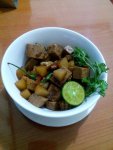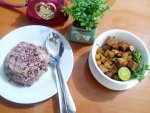Here's what Dr. Fuhrman says about coconut oil and other oils.
I do not think those old studies are relevant. They do not compare the use of coconut oil to the same diet without oil, they compare coconut oil to other oils, like corn oil or animal fats. In other words, adding coconut oil to a healthy diet gives it a lower nutrient per calorie density, the opposite of what you would want to achieve to promote longevity.
In other words, we know whole nuts or seeds, not flax oil or walnut oil are the healthiest way to get our fats. What if we did a study comparing fat from whole walnuts to coconut oil. It would be a no contest. Oil is oil. 120 calories of low nutrient fat per tablespoon that is absorbed rapidly.
The argument here for me is not whether on oil is marginally better than another, but if oil in general is a good food to advocate people use on a regular or substantial basis, when we know nuts and seeds (not oil) have huge health benefits.
I do not think those old studies are relevant. They do not compare the use of coconut oil to the same diet without oil, they compare coconut oil to other oils, like corn oil or animal fats. In other words, adding coconut oil to a healthy diet gives it a lower nutrient per calorie density, the opposite of what you would want to achieve to promote longevity.
In other words, we know whole nuts or seeds, not flax oil or walnut oil are the healthiest way to get our fats. What if we did a study comparing fat from whole walnuts to coconut oil. It would be a no contest. Oil is oil. 120 calories of low nutrient fat per tablespoon that is absorbed rapidly.
The argument here for me is not whether on oil is marginally better than another, but if oil in general is a good food to advocate people use on a regular or substantial basis, when we know nuts and seeds (not oil) have huge health benefits.
Again, I think you have boxed yourself in. The studies about coconut oil are not old. I don't know why you say that..Why are you ignoring all the studies and info? Coconut is a nutrient dense food. I know Fuhrman is into that paradigm, which is fine. But again, not to the extreme of dogma and ignoring proven information. Did you not read my post about the Living Foods Institute? There no one is comparing oils with oils. They are using coconut oil exclusively, with great results. Go with what works, not a self imposed dogmatic cage.




